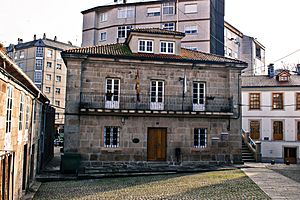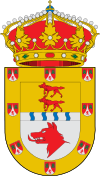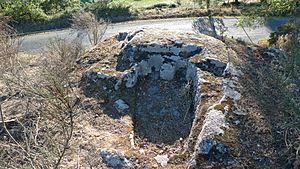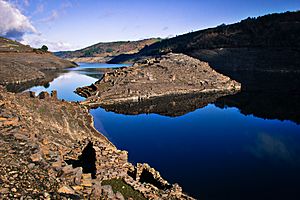Chantada facts for kids
Quick facts for kids
Chantada
|
||
|---|---|---|
 |
||
|
||
| Country | Spain | |
| Autonomous community | Galicia | |
| Province | Lugo | |
| Comarca | Chantada | |
| Area | ||
| • Total | 176.7 km2 (68.2 sq mi) | |
| Elevation | 36 m (118 ft) | |
| Population
(2018)
|
||
| • Total | 8,324 | |
| • Density | 47.108/km2 (122.01/sq mi) | |
| Demonym(s) | Chantadinos | |
| Time zone | UTC+1 (CET) | |
| • Summer (DST) | UTC+2 (CEST) | |
| Postal code |
27500
|
|
Chantada is a town in the province of Lugo, Galicia, Spain. It's a municipality, which is like a local government area.
The town sits on the left side of the Asma River. This river flows into the bigger Minho River. Chantada is also on the main road that connects Ourense and Lugo.
It's the main town in a rich farming area. This area is between the Minho River and the O Faro mountains. Even without a railway, Chantada is busy with trade. People here trade things like grain, flax, hemp, and dairy products.
A Look at Chantada's Past
Ancient Times
To understand Chantada's history, we need to go way back. The area was once home to many ancient settlements called castros. These were fortified villages from the Iron Age.
You can still see how these castros were built in the design of old castles. Some examples are the castles of Líncora, Centulle, and San Sebastián. Many important buildings were later built on top of these old castros.
These include the monastery of San Salvador de Asma and the fortress of Paderne. There are also old towers like the tower of Arcos and the tower of Pereira. Another interesting find is the anthropomorphic sarcophagi of Fornas. These are stone coffins shaped like humans. They show us how early people lived here.
Roman Influence
Chantada was close to an important Roman road. This road connected the modern cities of Braga in Portugal and Astorga in Spain. Because of this, there are many signs of the Roman presence in the area.
One example is the fortified village of Castro Candaz. Stories say that a Roman consul named Lucio Cambero founded Castro Candaz. He was linked to the local "Galician mountain people."
These people fought against Roman legions sent by Emperor Trajan. After a defeat, Lucio Cambero supposedly went back to the fortress.
The Middle Ages
During the Middle Ages, there were also attacks from Vikings. It's believed that Vikings crossed Mount Faro and reached Chantada. They built a fence there, which was called Plantata.
After attacking the town, the Vikings kept moving. The local nobles found safety in Castro Candaz. The family of Erice or Eriz guarded them there. They also got help from the troops of King Ramiro I of Asturias.
During this time, Castro Candaz might have been connected to a port. This port would have been used to cross the Miño River.
See also
 In Spanish: Chantada para niños
In Spanish: Chantada para niños
 | Leon Lynch |
 | Milton P. Webster |
 | Ferdinand Smith |





